Blackout Rugby Manager is a complete manager simulation title that puts users into the shoes of a Rugby manager of a new club. From the house of Blackout Games, it allows players to visualize their game plans coming to life on the field to achieve victory. Players must create match-day tactics and playstyles to take advantage of their team’s strengths. In this Blackout Rugby Manager Beginners guide, we will discuss the basics of the game so that players can get up and running with their club, talk about the basic in-game resources and their utility, and share some useful tips and tricks from our experience of playing the game.
Decoding the in-game Competitions
Now that we are familiar with the in-game resources, let’s have a quick look at the various game modes that are available for players to showcase their strategic moves. Below are the competitions that you can take part in and earn awesome rewards in the form of Tokens and Experience Points.
1. League Matches
League is basically a competition where your side routinely takes on 12 other clubs in a 28-day hunt. These matches are automatically scheduled and run. Some other salient features of League Matches are:
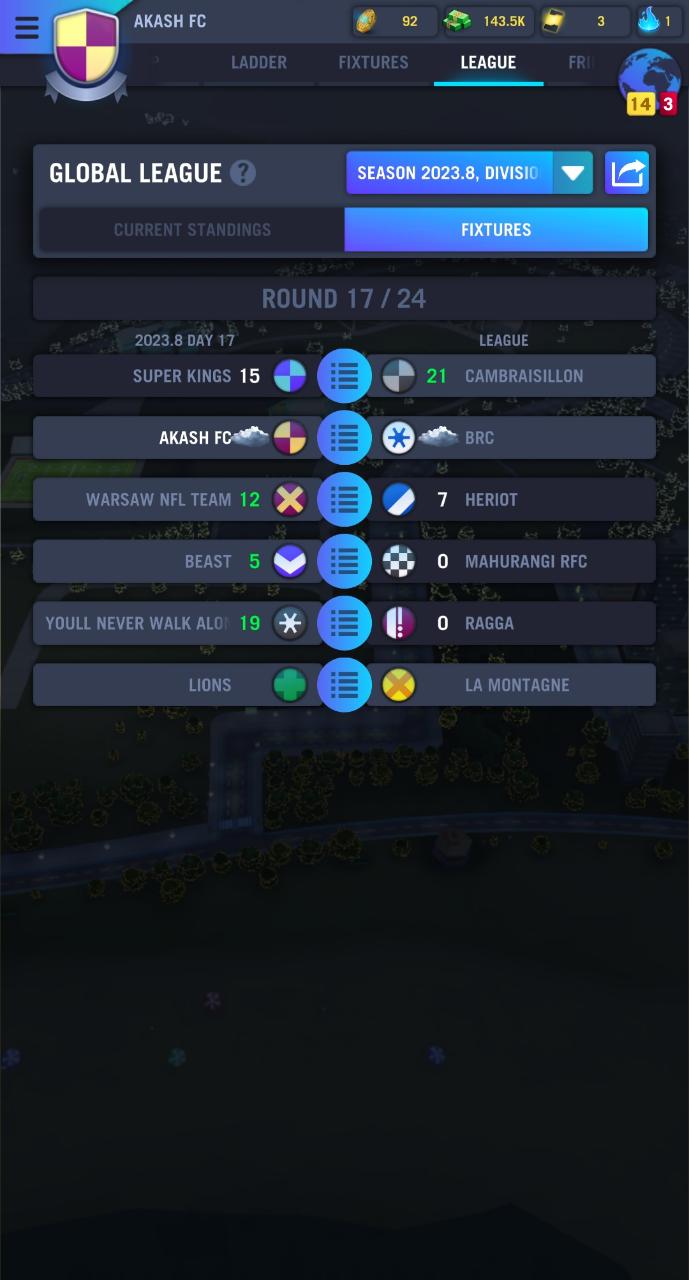
- Each club earns 4 points for a win, 2 points for a draw, and an extra bonus point if they manage to score three tries over their opposition.
- At the end of the league stage, the top 4 clubs engage in the play-off battle that includes a two-round knockout competition.
- Every league falls into a certain division. If you are a newbie, you will be starting with clubs from Division 1.
- As your club goes on to play League matches, it earns something known as Experience Points. The more experience points you stack up, the higher your club’s chances of getting a Division Promotion.
2. Ladder Matches
As the name suggests, Ladder Matches take into account the Global Ladder Ranking. In Ladder Matches, players challenge each other for an online encounter in a quest to go up the Global Leaderboard.
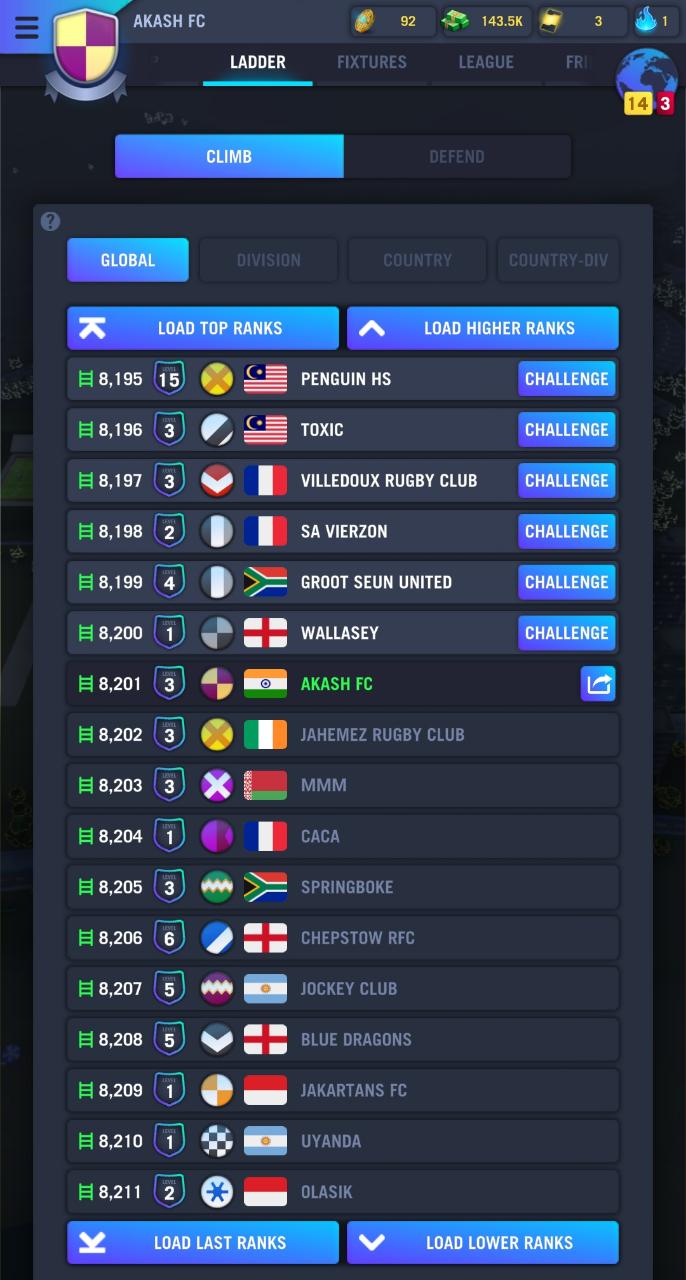
- Ladders challenges have further sub-categories like Global, Division, Country, and Country-Division.
- Playing Ladder Mode games earn loads of Tokens, Cash, Cards, and Med Packs based depending on investment in the Ladder Meds.
3. Friendlies
Friendlies for the large part, make sure that you get enough match practice for League and Ladder Mode games.
- Friendly Matches allow instant matchmaking with any of the clubs you want to play against.
- You just need to choose the club and schedule the match. Your opponent just has to accept the incoming challenge and vice versa.
- The result of Friendly matches doesn’t affect your position in League and Ladder modes. Any injuries sustained by players in friendlies won’t reflect in the original online competitions.
Resource Management
Talking about in-game currencies and resources, the game brings you Tokens, Club Cash, and Card Energy as the primary resources. Let us understand what they bring to your table next:
1. Tokens
Tokens are nothing but an in-game currency that players can utilize to purchase various items or to make cosmetic changes to their club. Almost all in-game spending can be done using Tokens. They can be additionally used to complete all the upgradation projects of your stadium and other amenities immediately, i.e., before the timer ends.
2. Club Cash
Club Cash is another in-game currency that is used mainly to upgrade the infrastructural facilities in your club, including Stadium, Training, amenities, etc. The amount of Cash currency required to upgrade each of these facilities takes a leap with each upgrade.
3. Card Energy
Players acquire certain skill-booster cards from drops that allow them to enhance the technical skill of their squad, on-field. Utilizing these cards requires the consumption of a specific in-game resource known as Card Energy. Unlike other resources, card energy cannot be exchanged with in-game tokens or club cash thereby reducing the gap between premium users and free users. Card Energy is denoted by a blue flame in-game.
4. Daily Cards
Daily Cards shelter a wide variety of cards that can be used when playing matches, training players, and negotiating player contracts. They can be received upon upgrading the Training facilities of your club on that given day. These daily cards disappear at the end of the day. So, make sure you are utilizing them on that very day only.
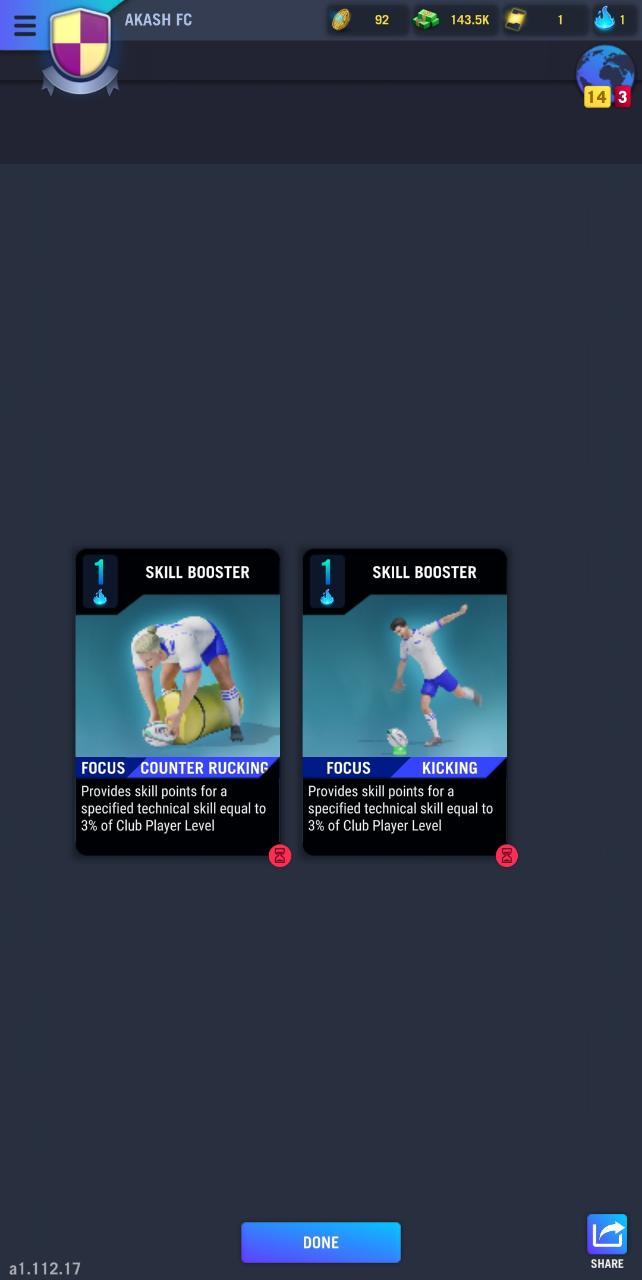
5. Permanent Cards
In addition to Daily Cards, players can also get hold of Permanent Cards that don’t disappear on a daily basis, from the drops. Each of these cards can provide skill points to your players, for a specified technical skill, equal to 3% of the Club Player label. Utilizing these skill booster cards requires consuming Card Energy which we have already discussed in this section. The amount of Card Energy required to be consumed would be mentioned at the top-left corner of the card.
Blackout Rugby Manager Beginners Guide: Tips and Tricks
Here are some useful in-game tips in our Blackout Rugby Manager Beginners Guide for beginners to get channelized in the right direction when it comes to choosing sponsors, infrastructural upgrades, and squad training as they look to build their dream club from scratch. What follows next are some useful tips and tricks from our experience of playing the game.
1. Choose a Sponsor that best fits your needs and playstyle
At the start of every season, you are required to sign a sponsor for your club. These sponsors come with different ways of rewarding you. While some reward you tokens daily irrespective of whether you log in or not, the others either provide a condition wherein you have to log in each day for the reward or provide you a lump sum at the start of the season and set playing conditions that need to be achieved for earning the rest. It is important that you assess your playstyle and take a calculative decision while selecting a sponsor.
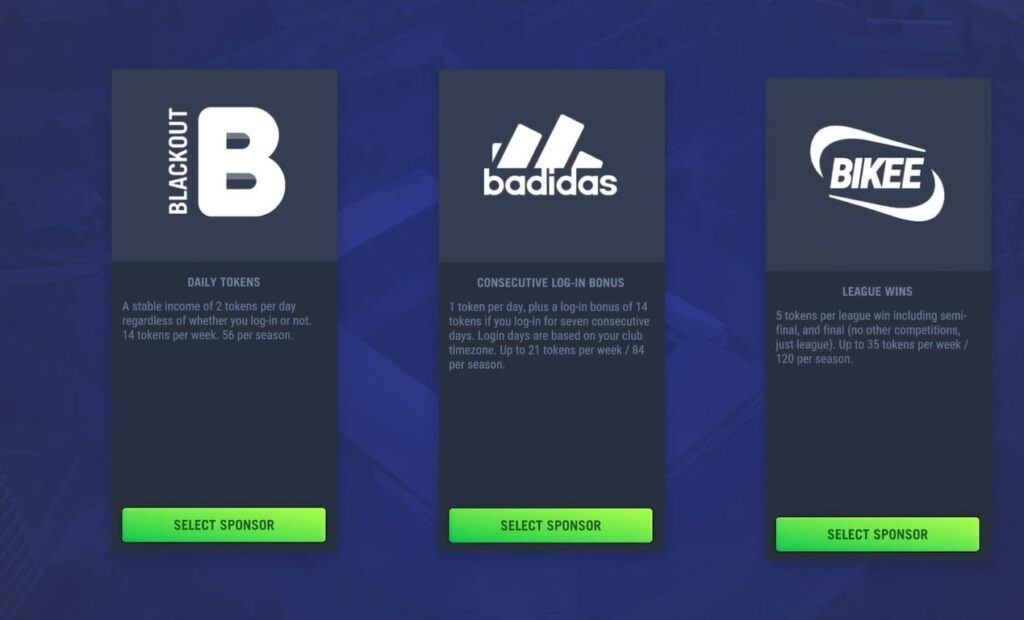
Generally, the ones that come with conditions like winning the semi-final of the League competition or providing a lump sum at the start of the season, end up rewarding more tokens. However, if you are a newbie, that won’t be a wiser decision since you also need your hands set before winning a competition. Also, decide based on your login frequency.
2. Start by upgrading your Stadium amenities
As a newbie, the first thing that you should look to do is upgrade the amenities of your Club’s stadium. Upgrading your stadium would cost you a certain amount of Club cash that increases with each update. Look to upgrade the Stands first. This would increase the seating capacity of your stadium and in turn, generate more revenue(in the form of Club Cash) for your club. So, it’s an absolute no-brainer.
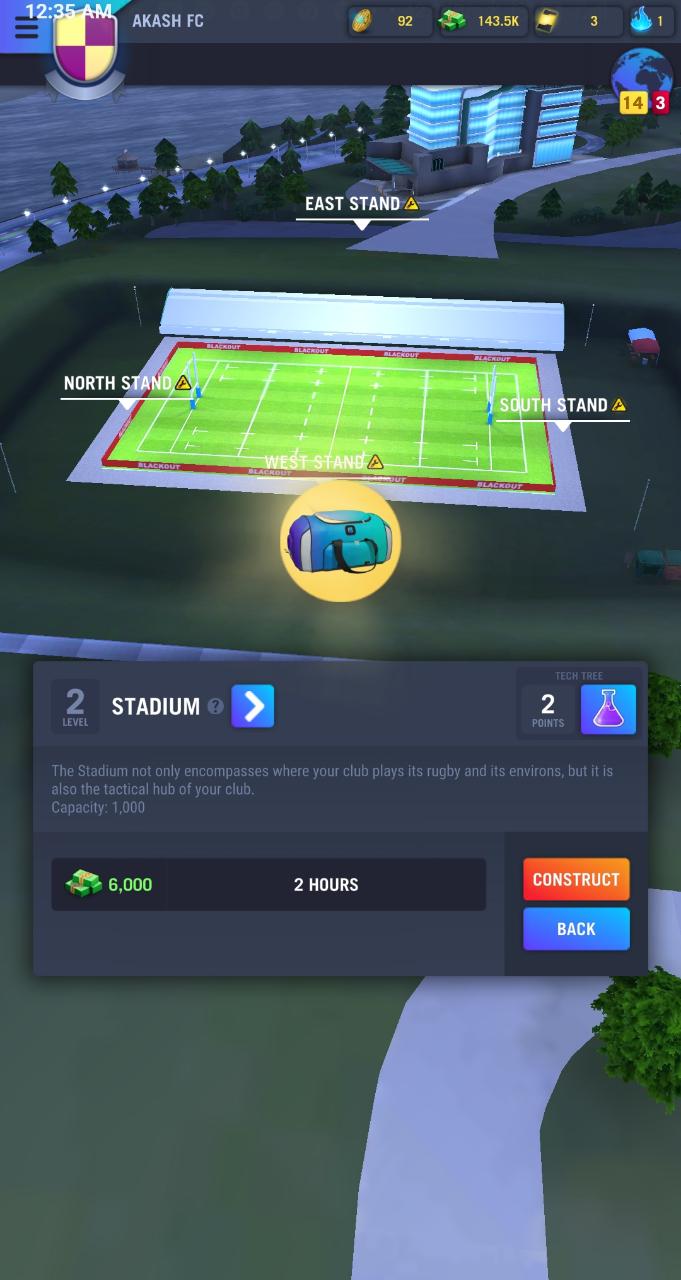
3. Upgrade the Training Facilities of your club next
The next important sector that you must look to upgrade is your club’s Training Facility. Just as we discussed in the previous section, upgrading the Training facilities of your club earns you Daily cards. These cards mainly act as Player Contract Negotiators, and Skill boosters that can serve as value addition to your squad. So, besides your stadium, make sure you are upgrading the Training facilities also, on a daily basis so as not to miss out on these freebies.
4. Run Training on your squad members for an enhanced in-game performance
Another important aspect of Blackout Rugby Manager is Player Training. There would be a bar at the bottom right corner of the Player Info tab for each player, indicating the level that he is currently in. Players can level up either with age or you can level them up by just playing the game.
To accelerate this process and to enhance their performance in-game, you can run training by tapping on the Training amenity while you are on the Club tab. There are two types of Training that can be run:
- Physical Training
- Technical Training
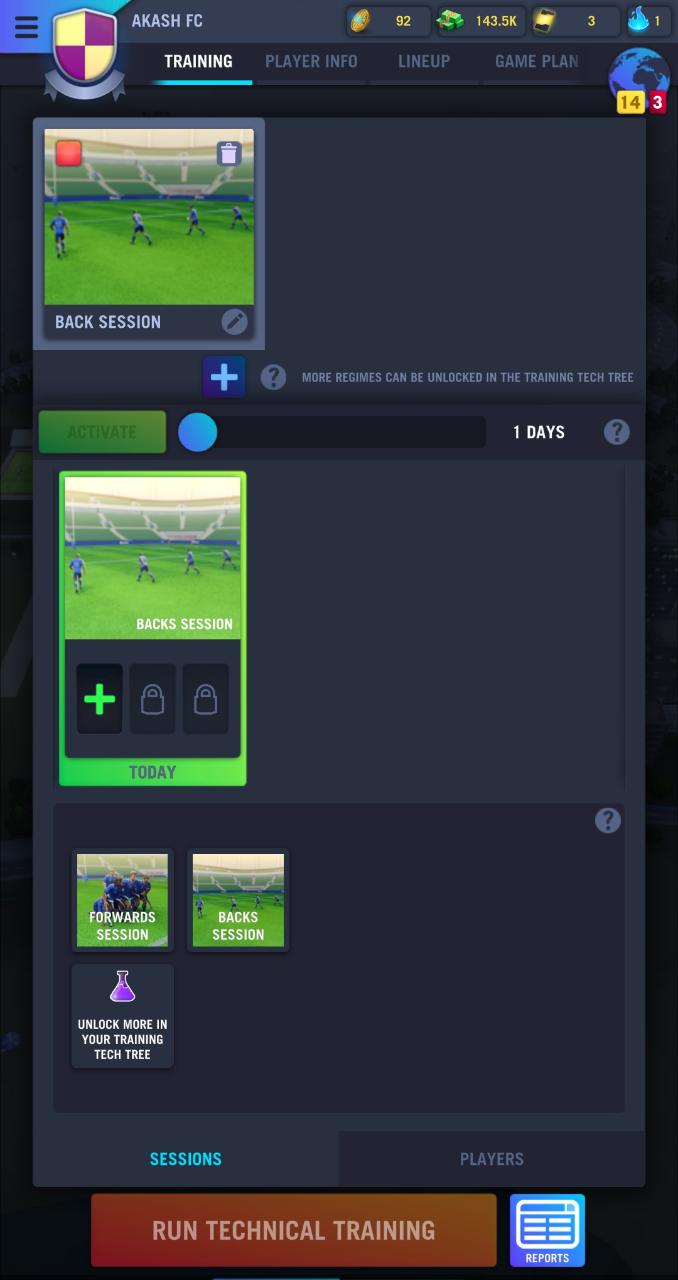
To make your players undergo Training, you need to create a training regime while on the Training tab. You must then add the preferred Training type to the Training Regime, by simply dragging and dropping. Players must note that a single squad member can undergo only one Training type in a day.
5. Choose players for training depending on the type of Training
Even though you can make every squad member undergo a different Training type, it is advisable that users choose players for Training depending on the Training type. For instance, if you are adding a Back session to the Training regime, the players that you must pick are Scrum-Halves, Fly-Halves, Centres, and Fullbacks. Similarly, if you are choosing a Forward session, then you must look to assign the Forward line players to it.
6. Utilize the Transfer market to strengthen your line-up
The Market tab on your game screen houses the players that are listed for sale. Get players based on the strengths and weaknesses of your club. If your club lacks good Forward line players, try getting good buys from the Transfer Market. The starting bid price of a player depends on the Player’s Level. The rules are pretty simple:
- Once a manager places the opening bid, the auction starts and goes on for the next 24 hours.
- At the end of the auction, the manager with the highest bid wins the player.
- However, if someone bids one minute after the bidding ends, the auction would get extended for two more minutes.
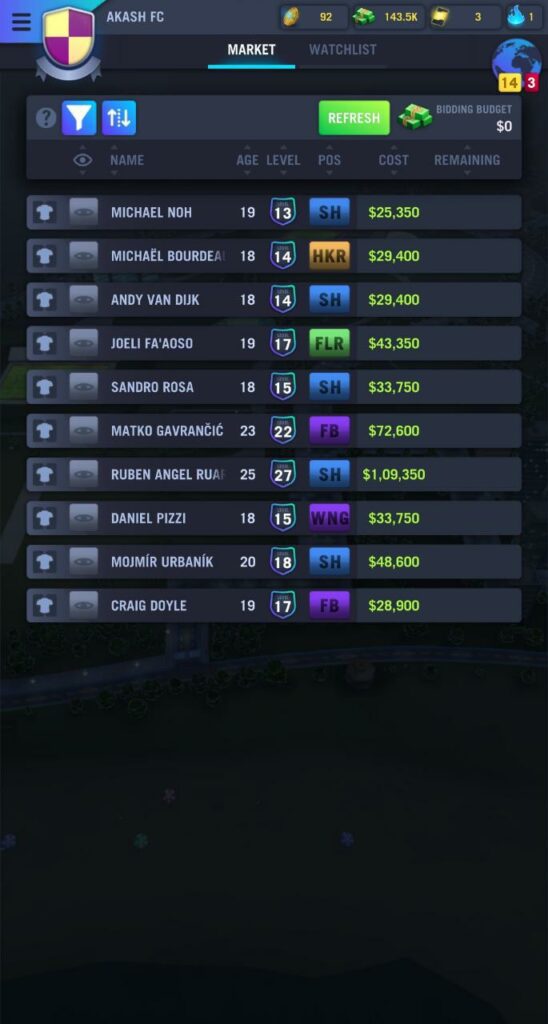
If you are desperately in need of a player from the Transfer market and cannot check the status at the end of 24 hours, we suggest you go for an auto-bid instead of a normal bid. An auto-bid would increment the bidding price set by you, by a fixed number every time someone out-bids you, up to a certain extent. So, apart from infrastructural development, make sure that you are also keeping aside some cash for getting good buys from this window.
7. Consider the physical attributes of your players while assembling your line-up
Physical abilities like height and weight or the Body Mass Index(BMI) to be precise, plays a huge role in the in-game performance of your player. While assembling your back-line players, try picking those players who have a higher BMI. This is because players with high BMI would do good while tackling and making ground. For Forward line players, make sure that the players that you have chosen to feature in your XI have comparatively lower BMI. This would enhance the attributes like Speed and Agility that are needed from a Forward.
Final Thoughts
For someone who has always dreamt of managing a Rugby club’s ecosystem in its entirety, Blackout Rugby Manager is no short of a paradise. From matchday tactics to lineup analysis, the game puts each and every managerial skill of users to the test. It is definitely worth giving a try if you are a Rugby Union fan.
That’s all for today’s Blackout Rugby Manager beginners guide. Did you find our Blackout Rugby Manager beginners guide helpful? Do let us know in the comments below!
For more Mobile Gaming news and updates, join our WhatsApp group, Telegram Group, or Discord server. Also, follow us on Google News, Instagram, and Twitter for quick updates.
The post Blackout Rugby Manager Beginner Guide and Tips appeared first on GamingonPhone.
from GamingonPhone https://ift.tt/Fp3Ry2E


No comments:
Post a Comment